Dental Implants – Northampton, MA
Dentists will do everything that they can to save your natural teeth. Unfortunately, sometimes this is not always possible. Although dental implants are not an exact replacement for a natural tooth, they are a close second. If you have one or more missing teeth, or are scheduled for a tooth extraction, you may have already begun exploring your treatment options. If so, you should definitely consider getting dental implants in Northampton.
What Are Dental Implants?
A dental implant is a medical device that is inserted directly into the jawbone to replace a missing tooth. Each implant is made up of three parts: a metal screw constructed from titanium, an abutment and a crown.
Titanium is used, along with other metals, because of its superior strength and durability. It is also biocompatible with the human body.
The abutment component of the device serves as a connector between the titanium metal screw and an eventual dental crown that caps the entire structure, allowing you to bite and chew normally.
The Dental Implant Process
Getting a dental implant will require multiple dental appointments. At your first visit, your dentist will implant the titanium screw right into your jawbone. Just this one part of the process ensures that you do not undergo a condition called resorption, or jawbone loss. Without the presence of a “tooth” root, the underlying jawbone begins melting away, which can cause teeth to shift into this empty space.
If you have undergone resorption, you may have inadequate jawbone mass to support a dental implant. If so, you can still get one if you undergo a bone graft procedure, which is used to shore up the area so that it can provide firm support for a new implant.
If you have sufficient jawbone mass, you would first receive the first component of the dental implant: the metal screw. It will take a few months for your jawbone to organically fuse around the new implant. When this process is complete, you will return for another appointment to have the abutment part of the structure placed.
Finally, your dentist will place a dental crown onto the abutment. The crown serves to replace the visible part of a natural tooth, allowing you to bite down and chew with normal force.
The 4 Step Dental Implant Process
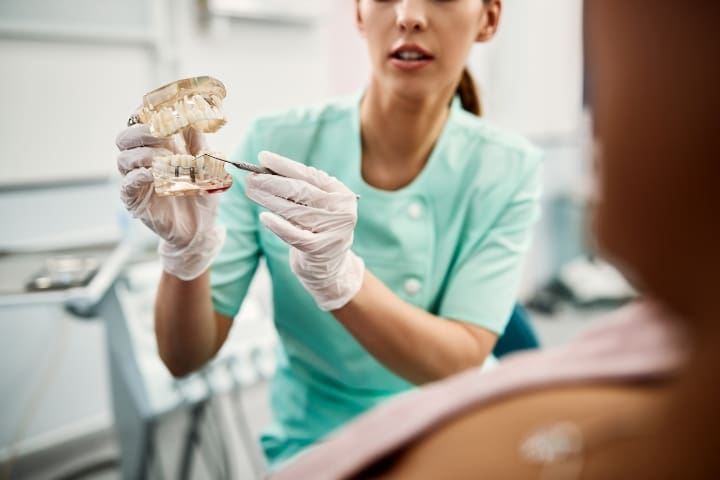
If you’re interested in getting dental implants in Northampton, you should know that there are 4 major steps involved in the process. We can discuss the details in more depth during your consultation, but in the meantime, it’s nice to get a general idea of what to expect! Below, we’ve put together helpful information about the average dental implant treatment. Give it a readthrough and let us know if you have any questions!
Initial Dental Implant Consultation
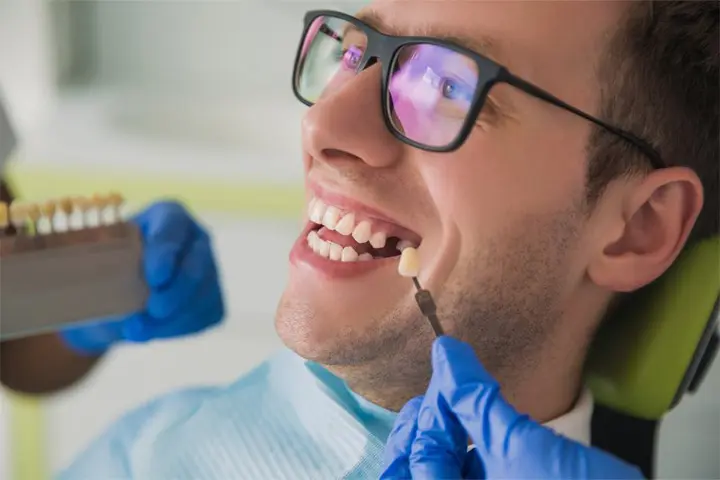
We mentioned a consultation earlier, but what exactly is a dental implant consultation?
Basically, the point of a consultation is to make sure you and our team are on the same page. It’s the perfect opportunity to discuss your restoration goals with us in person, and gives us a chance to examine your mouth. Based on our findings and your preferences, we’ll build a fully personalized plan for your treatment.
Dental Implant Surgery

Once we’ve confirmed how you would like to proceed, we’ll get you ready for the implant placement surgery. This includes administering a general anesthesia or any requested dental sedation, such as laughing gas or IV sedation. Our implant dentist will then get to work anchoring the titanium implant posts to your jawbone.
Dental Implant Osseointegration & Abutment Placement
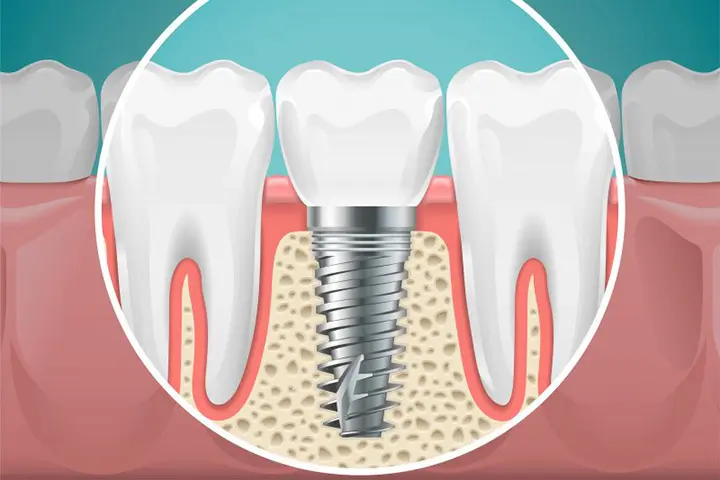
Possibly the most important part of the dental implant process is osseointegration – in other words, when your jawbone and titanium implant post fuse together. This is why dental implants are so stable and can provide more bite power, so it’s very important to rest and let your oral biology do its thing!
After osseointegration is complete, you’ll return to our office in Northampton to receive your abutments. These connector pieces are small, but will allow us to fix your crown, bridge, or denture to the implant posts, so they nevertheless play a big role!
Delivery of Dental Implant Restorations

We’ll be able to finally complete the process and place your crown, bridge, or denture once we receive your customized restoration from the dental lab. The skilled artisans crafting your restoration will make sure it looks natural, so that the size, shape, color, and shine gives your smile a completely seamless look. You’ll be able to see the quality aesthetics for yourself when we finish connecting the restoration to your abutments!
Benefits of Dental Implants

Compared to other restorations, dental implants have many more perks. It’s to the point that modern dentistry views them as the gold standard of tooth replacement. Similarly, patients enjoy implants enough that dentists place 500,000 of them yearly. These facts testify to the significant and noteworthy benefits of dental implants. To learn about those benefits in detail, please keep reading or call our office today.
Day-to-Day Benefits

Often, the day-to-day benefits of dental implants are the most obvious ones. They include:
- Beautiful Looks – Thanks to their porcelain tops, dental implants look lifelike and blend seamlessly with your smile. Most people won’t even notice that they’re artificial.
- A Confidence Boost – Once they restore your smile, dental implants should give you a major boost in confidence. You won’t have to worry anymore about the gaps between your teeth.
- Easy Eating – Since dental implants fuse with your jaw, they ultimately restore your bite’s strength. That effect allows you to eat tough foods again!
- Low Maintenance – Dental implants work like natural teeth, so they don’t require as much maintenance as dentures or dental bridges. Daily brushing and flossing should keep them clean and functional.
Health Benefits

Aside from their everyday perks, dental implants also have several health benefits. Some of the most notable ones are:
- Tooth Support – When smile gaps go untreated, they make further tooth loss more likely. Dental implants reduce that risk by filling the unpleasant spaces between your teeth.
- A Stronger, Fuller Jaw – Unchecked tooth loss erodes your jawbone, greatly weakening our jaw over time. Thankfully, well-placed dental implants stop (and reverse) this erosion.
- A Cleaner Mouth – Smile gaps are breeding grounds for bad bacteria, making tooth decay and gum disease more likely. However, dental implants fill those spaces to improve your oral health.
- Better Nutrition – By restoring your bite (see above), dental implants broaden your range of meal choices. This wider field ensures you get crucial vitamins and minerals.
Long-term Benefits
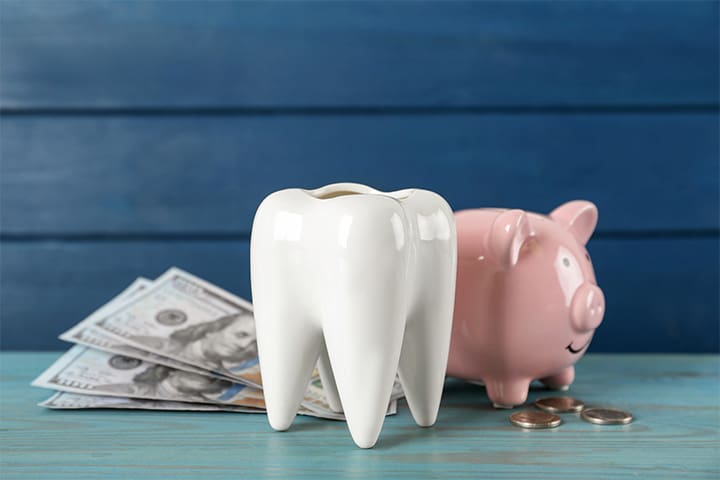
If they’re given proper care, dental implants have a slew of long-term benefits as well. These include the following:
- High Success Rate – So long as it’s done by a qualified dentist, dental implant treatment nearly always succeeds. It even has a ten-year success rate as high as 98%!
- Long-Lasting Results – Most dental implants tend to last a long time. For example, an average one will have a lifespan of roughly 15-20 years. A well-maintained post can even work for more than 30 years!
- Cost-Effective Care – Dental implants save you money in the long run, despite their higher upfront cost. Their long lifespans (see above) keep them from needing costly repair or replacement work.
Who Dental Implants Can Help

Almost everyone with missing teeth can be an excellent candidate for dental implants. During your consultation at our Northampton office, our dentist will carefully inspect your mouth and medical history to determine if you qualify for the treatment. If you’re not ready yet, you may be able to receive implants later after receiving some restorative work. Here’s a brief guide to who can benefit from dental implants, but please contact our staff if you’d like to learn more.
Who Is a Good Candidate for Dental Implants?

Almost any healthy adult can receive dental implants. The three major factors that determine if a patient is a good candidate are:
- Overall health: Patients will have to be physically well enough to safely receive minor surgery.
- Oral health: Patients will need to be free of tooth decay and gum disease before they can receive dental implants. We’ll gladly perform treatments like gum disease therapy, dental fillings, and root canals at our office to get you in shape for these appliances.
- Jawbone health: The jawbone begins to atrophy and recede after tooth loss, which can eventually leave the patient with insufficient bone mass for dental implants. Luckily, this issue can usually be resolved with bone grafts.
Once you’re ready for dental implants, our dentists will gladly design a specialized treatment plan based on how many teeth you are missing and the best ways to ensure the success of your restorations.
Missing One Tooth
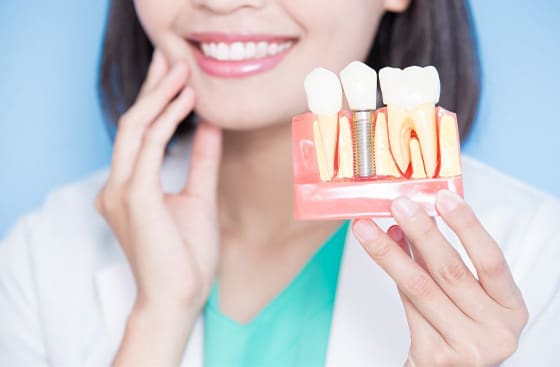
If you are missing a single tooth, you will only need a single dental implant to mount a beautifully lifelike dental crown. This is a significantly more sturdy and longer-lasting solution than a traditional dental bridge, and it doesn’t require the alteration of healthy teeth.
Missing Multiple Teeth
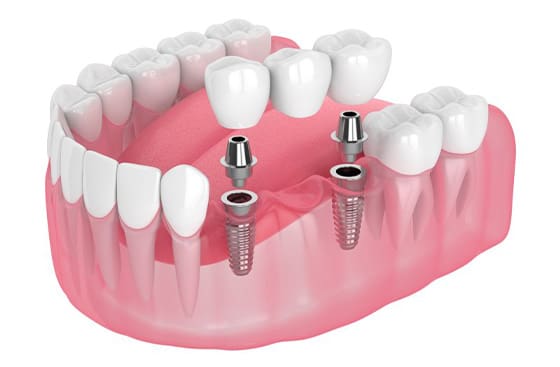
If you’re missing several teeth in a row, we can use two dental implants to secure a lifelike dental bridge. This appliance will seamlessly complete your smile without the removal of any healthy enamel.
Missing All Teeth
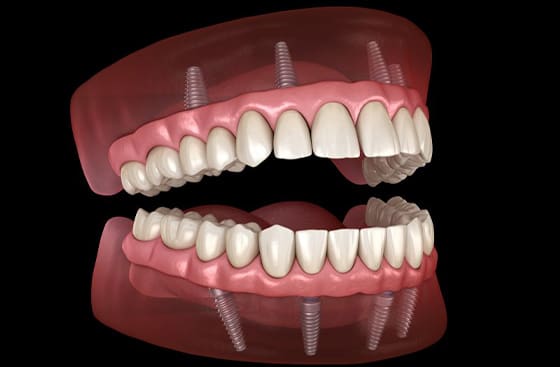
If you have lost all of your natural teeth in an arch, four to six dental implants placed at the strongest points in your jawbone can be used to support a full denture. By securing the appliance in this way, implants eliminate many of the problems that can come with traditional dentures such as the device slipping out of place during speech or meals. This sturdy hold also allows patients to enjoy a wide variety of delicious and nutritious tough and crunchy foods like steak, nuts, and raw fruits and veggies.
Dental Implant Post-Op Instructions

Remember that after your dental implant posts are surgically fixed to your jawbone, it’s important to give your mouth plenty of time to heal so osseointegration can progress smoothly. Since this part of the process is vital for the success of your implants, you’d probably like some helpful post-op instructions! Rest assured, our team will review these with you in person and make sure you’re well-equipped for recovery. If you’d like to get a general overview in advance, though, you can read the information we’ve put together below.
What to Do Directly After Dental Implant Surgery

It might sound strange, but a blood clot will form at the surgery site, and it’s important not to disturb it! This is actually a healthy clot that will help protect the area from bacteria and infection. To keep it intact, you should:
- NOT drink from a straw
- Stop smoking or chewing tobacco
- Avoid touching the implant site
- Skip out on strenuous activities
- Waterfall liquid from your mouth instead of spit
Common Side-Effects When Recovering from Dental Implant Placement

You’ll likely experience some discomfort after your implant post placement surgery, and we don’t want you to panic. Symptoms like these are considered normal:
- Oral soreness or tenderness
- Swelling of the gums
- Intermittent bleeding
To relieve these side effects, you can take prescribed or over-the-counter pain medicine, apply a cold compress for swelling, and use gauze to gently staunch bleeding. If your symptoms become persistent or grow worse, however, give us a call promptly!
Your Diet After Dental Implant Surgery

Foods that are too chewy, crunchy, or hard can also disturb your all-important blood clot. Plus, excess pressure from chewing these types of treats risks interfering with osseointegration. You should maintain a fairly strict soft food diet, which means sticking to foods like:
- Pudding
- Soup
- Yogurt
- Scrambled eggs
- Mashed potatoes
- Soft pastas
Post-Op Health & Oral Hygiene

In order to maintain your oral health and promote smooth osseointegration, you’ll have to keep up with a solid oral hygiene routine. This will help you avoid developing hazardous complications like cavities and gum disease! Here’s what we recommend:
- Brush your teeth twice daily, moving carefully and gently when approaching your implant site.
- Rinse your mouth with salt water after finishing your meals.
- Floss at least once per day, once again proceeding carefully near your implant posts.
- Do NOT use mouthwash with alcohol, as it could irritate your sore gums.
What to Do After Your New Teeth Are Attached

Recovering from the final placement is less involved than your post-op. You might experience some mild soreness, but this can usually be alleviated with over-the-counter pain medicine. At this point, bleeding and swelling should be less common, so let us know right away if you experience these symptoms after we attach your new teeth. Otherwise, simply enjoy the benefits of your restored smile!
Maintaining & Caring for Your Dental Implants

Overall, dental implants are incredibly successful. Even after ten years from initial placement, they continue to maintain a success rate of 90%! That said, proper care and maintenance is still important for helping them go the distance as a reliable tooth replacement. Follow the tips we’ve put together below, and you’ll be able to enjoy the benefits of your new dental prosthetics for years to come.
Make Oral Hygiene a Priority
Dental implants may not be able to develop cavities in the same way natural can, but they should still be maintained with regular oral hygiene! If bacteria gets caught between your teeth or plaque starts to build up near your gumline, your gums and any remaining natural teeth will still be in danger. Fortunately, dental implants can be brushed twice daily and flossed once per day just like natural teeth!
Eat a Healthy Diet
One of the perks of having dental implants is that after the recovery period, you’ll be able to eat anything you want. That doesn’t mean you should “load up” on sugars and acids, though! Too much sugary or acidic foods could still expose your mouth to harmful oral conditions. Sugar accelerates cavity and gum disease-causing bacteria, for example, while acid weakens your enamel over time, making your pearly whites more vulnerable. Plus, eating healthily is best for your overall health, too.
Break Bad Habits
Dental implants are incredibly sturdy, but certain bad habits will still cause premature wear. If you’d rather they last as long as possible, try to avoid nail biting, smoking, crunching ice, and using your teeth as tools. Pressure from biting into hard objects will gradually grind down the material, while smoking will make it more difficult for your gums to support the implants.
Protect Your Dental Implants
Another habit that wear down your dental implants is bruxism – which is a professional term for teeth grinding and clenching. With a custom-made oral device, you can protect your implants from the excess strain this habit causes. We have both mouthguards and nightguards, so let us know if you grind or clench your teeth!
Schedule Regular Dental Checkups
By scheduling regular checkups every six months, you give us the chance to check on your dental implants. We’ll make sure they’re still functioning well and are firmly in place – and we’ll give your smile a professional cleaning so it feels nice and fresh for the rest of your day!
Understanding the Cost of Dental Implants

Even if you really want dental implants, you should learn their price before you commit. Otherwise, you could end up getting a treatment you can’t afford. Just note that the cost of dental implants varies by patient; you’ll need to see our dentists for a precise estimate. Our team will also work with you to make care affordable, guiding you through its pricing factors, dental insurance, and more. Learn additional details by reading below or by calling our office.
Preliminary Treatments & Dental Implant Surgery
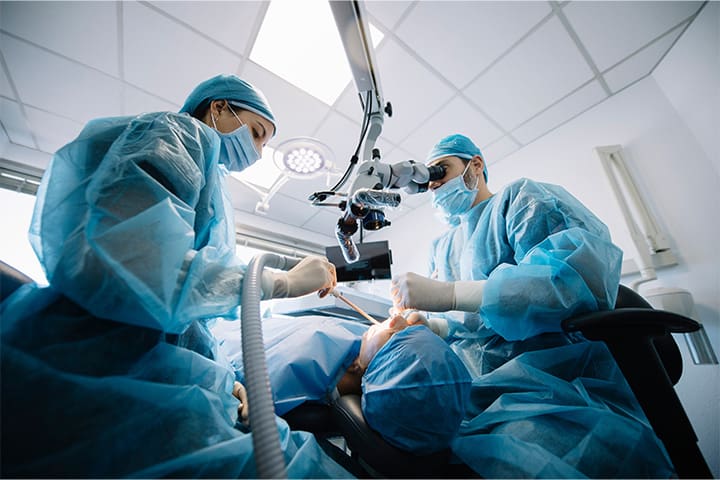
Sometimes, a patient needs other services before a dental implant surgery. These “extras” can range from simple tooth extraction to gum disease therapy or bone grafts. If added to our overall treatment, they’ll add to your final expense; the upside is that dental insurance can partly cover them.
Dental implant surgery also incurs its own price. Depending on factors like implant location, sedation, and the specific surgeon, placement can cost much or little. Still, you can expect good results from us – we perform the placement ourselves! That way, you don’t have to pay a separate specialist.
The Parts of Your Dental Implant
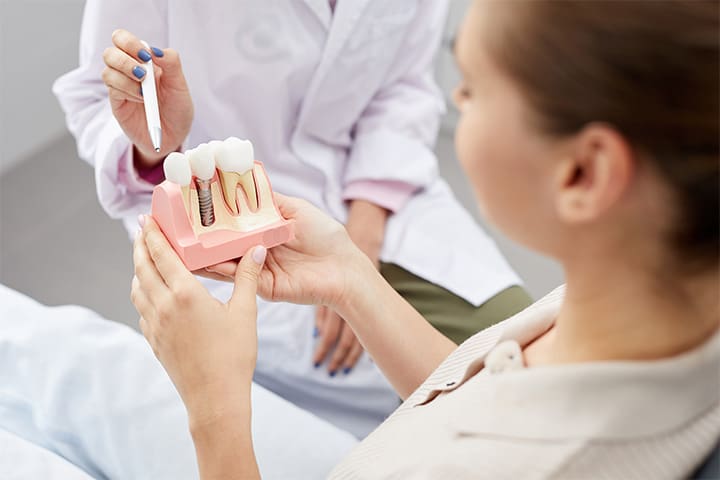
Even the parts and features of dental implants affect their final cost. In particular, these include the following:
- Implant Number – As your treatment places more dental implants, it’ll become more expensive.
- Implant Material – In some instances, a dental implant may use pricier materials like zirconia instead of titanium.
- Implant Brand – Different manufacturers make dental implants differently, so implant brand also affects the final treatment price.
- Restoration Type – Note that dental crowns, bridges, and dentures have different costs.
How Dental Implants Pay for Themselves
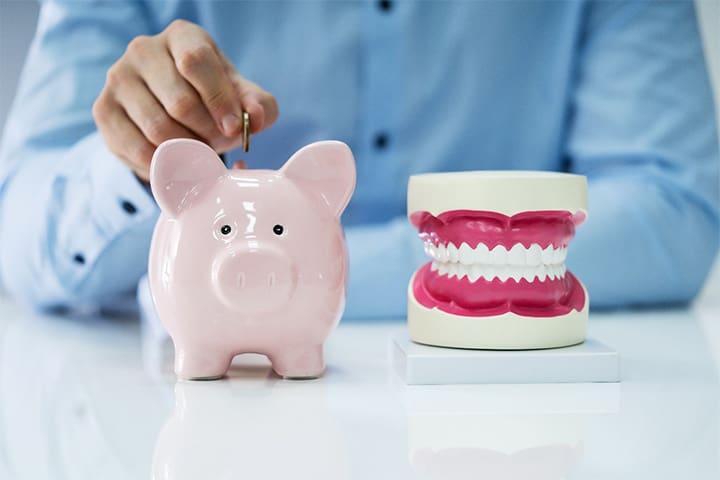
Despite their high upfront price, dental implants save you more money than dentures or dental bridges. They’ll basically pay for themselves over time, assuming you give them proper care.
Don’t forget that dental implants have long lifespans. They can last 30 years or more (with good care), so they don’t need frequent repair or replacement work. That means they’d let you save money otherwise spent on other dental care. In that way, your new teeth would “pay off” more than dentures or dental bridges would.
Does My Dental Insurance Cover Dental Implants?

While dental insurance rarely covers dental implants, some exceptions exist. Your own plan may offer benefits for a percentage of the treatment, a preliminary service, etc. Given that fact, there’s a chance you could get a discount on your care.
You should consult your plan provider before you commit to anything. Our team will help you do so if you need assistance.
Making Dental Implants Affordable
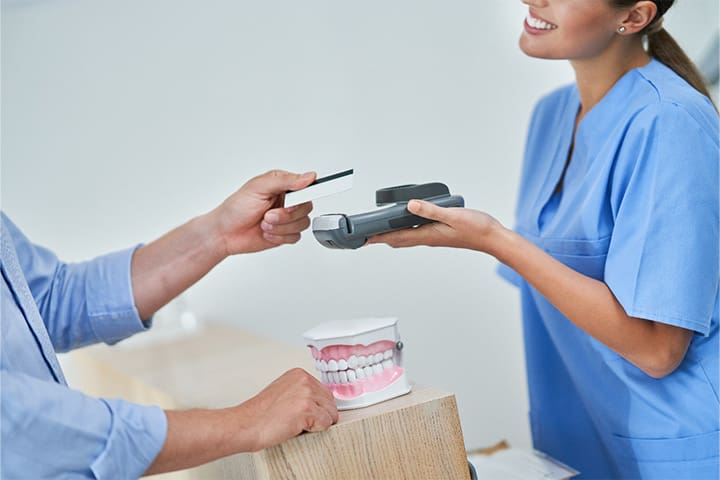
With or without insurance, you can still make dental implants affordable. Just rely on our practice’s helpful payment options for an assist! With the right one, your implant treatment will be budget-friendly.
For instance, consider our flexible financing program. This option lets you work with CareCredit – a 3rd party lender – to pay for care in monthly installments. That way, you wouldn’t have to meet the full treatment cost all at once.
Dental Implants FAQs
How Long Do Dental Implants Last?
Dental implants are designed to be a long-term solution for missing teeth, often lasting 20 years or more with proper care. The implant itself, typically made of titanium, integrates with your jawbone and can last a lifetime. However, the crown (the visible tooth) may need replacement every 10–15 years due to normal wear.
Factors influencing longevity include your oral hygiene, diet, and habits like smoking or teeth grinding. Regular check-ups with us help ensure your implant stays in excellent condition. With consistent care and healthy habits, you can enjoy the benefits of your dental implant for decades.
What Should I Do if My Implant Feels Loose?
If your dental implant feels loose, contact us immediately. A loose implant may indicate an issue such as bone loss, gum disease, or problems with the implant’s attachment to the crown or abutment. Avoid chewing on that side and maintain gentle oral hygiene around the area to prevent further complications.
We will assess the situation with a clinical examination and possibly X-rays. In some cases, the issue lies with the crown or abutment, which can often be repaired without affecting the implant. If the implant itself is loose, we’ll evaluate whether it can be stabilized or if replacement is necessary.
Timely action helps preserve your oral health and the success of your implant. Don’t delay—let us help address the problem effectively!
Can I Get Dental Implants If I Smoke?
Yes, you can get dental implants if you smoke, but smoking increases the risk of complications. Smoking affects healing, reduces blood flow to your gums, and can interfere with the process of osseointegration—where the implant fuses with the jawbone. This can lead to a higher likelihood of implant failure.
We recommend quitting smoking, especially during the healing period after implant placement. If quitting entirely isn’t feasible, reducing smoking significantly can still improve your chances of success. Maintaining excellent oral hygiene and attending regular check-ups with us are also critical for the long-term health of your implants.
Let’s discuss your options and create a plan to maximize the success of your treatment, even with the challenges smoking may present.
Is There Anything I Shouldn’t Eat with Dental Implants?
To protect your dental implants, especially during the healing phase, avoid hard, sticky, or excessively chewy foods. Items like hard candies, nuts, popcorn, and ice can stress or damage your implant or the crown. Sticky foods like caramel or chewing gum may dislodge temporary crowns or abutments.
After healing, implants are strong, but you should still exercise caution with very hard foods to avoid damaging the crown. Maintain a balanced diet with softer foods initially, like soups, yogurt, mashed potatoes, and fish.
We also recommend avoiding highly acidic or sugary foods, as they can harm surrounding gum tissue. Regular check-ups with us ensure your implants stay healthy and strong. With proper care and mindful eating, you can enjoy a wide variety of foods!


